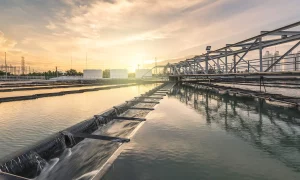Securing water for ecosystems and human well-being: The importance of environmental flows
The quantity, quality and timing of water flows required to sustain ecosystems and the valuable services they provide are referred to as Environmental Flows. To preserve and benefit from these services, water managers must ensure that an Environmental Flow regime is maintained in rivers and wetlands. This report highlights the connection between flows, ecosystem services and human well-being and concludes that environmental flows and the ecosystem services they support are critical to improve human well-being and achieving all eight of the United Nations Millennium Development Goals.

Healthy water ecosystems simultaneously serve multiple aspects of human well-being, especially among poor communities living close to the land-water interface. Ecosystem services have real economic value today and special importance in mitigating future problems and economic losses related to climate change. To preserve and benefit from these services, water managers must ensure that an environmental flow regime is maintained in rivers and wetlands. The report highlights the connection between flows, ecosystem services and human well-being and concludes that environmental flows and the ecosystem services they support are critical to achieving all eight of the United Nation’s Millennium Development Goals.
Lessons learned
- Recognising the values of ecosystems, and investing in them accordingly, are key to achieving the MDGs and alleviating poverty.
- Critical factors in establishing PES schemes include ensuring sufficient data to value services as well as the existence of legislation and implementing agencies to administer and track payments. In determining the value of services and translating them into payment mechanisms, it is critical to understand the relationship between upstream activities and downstream impacts.
- The limitations to energy and food production as well as navigation forecasted under climate change will necessarily entail reconsidering water allocations. Environmental
flows management, as part of a broader climate change adaptation strategy, can help mitigate some of the negative impacts climate change will have on freshwater resources. - Both governments and donors have under invested in improving water resource management.
Poor water resource management is also attributed to an unnecessarily large number of authorities involved in water resource management decisions. As a result, the overarching need for maintaining healthy freshwater ecosystems is overlooked, with the poor suffering even more due to their dependency on freshwater ecosystem goods such as drinking water and fish. The policy links between water management and poverty reduction require greater attention if the poverty reducing potential of reversing the loss of ecosystem services is to be realised. - Environmental flows can serve as an important link between environmental conservation and poverty alleviation in PRSPs as well as strategies to address the MDGs. Environmental flows offer an effective means for countries to to mainstream the environment -especially freshwater ecosystems – in national development planning processes.
For a fuller details of the recommendations, please download the document.
Citation:
Forslund, A., et al. Securing Water for Ecosystems and Human Well-being: The Importance of Environmental Flows. Swedish Water House Report 24. SIWI, 2009.



